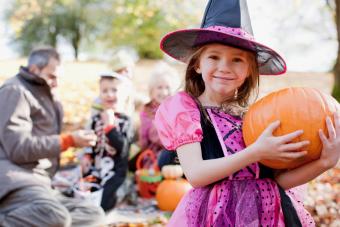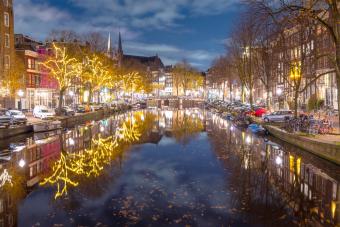
Halloween is a popular American holiday. It's a time of spooky fun when adults and kids dress up in costumes and go to parties or trick-or-treating, accompanied by ghosts, goblins, owls, bats, and other scary things. The Americanized celebration of Halloween has spread to other countries throughout the world as a fun and commercial event. So, how do European countries celebrate Halloween?
Halloween in Europe
Halloween is celebrated differently in different European countries, even in different regions and cities of those countries. With the influx of American tourists and expats, Halloween has and is gaining popularity in Europe, and many of the bigger European cities celebrate Halloween with special spooky events and tours, costume parties, fun, and merriment. Still, Halloween isn't as widely or lavishly celebrated in Europe as it is in the U.S., and in many European countries, culture, religion, and even politics overshadow or intermingle with Halloween.
Halloween in the Netherlands
In the Netherlands, Halloween is virtually non-existent, but it's been creeping up in popularity. In Amsterdam, the spooky day is celebrated by locals, students, expats, and tourists. During Halloween, the streets in Amsterdam come alive. There are trick-or-treaters, clubs host freaky Halloween parties, people dress in costumes, and candle-lit pumpkins are left outside houses.
But Halloween isn't celebrated throughout the Netherlands. In fact, in some parts of the country, a festival called Sint Maarten (Saint Martin Day) is celebrated on November 11th. This is when children in some regions of the Netherlands go door-to-door carrying lanterns with exciting shapes and colors and sing songs for treats or money.
Halloween in France
France is slowly embracing Halloween, but most areas of the country still don't celebrate Halloween at all. Except for Paris, Halloween passes by without much fanfare. But even in Paris, Halloween is primarily celebrated by expats, tourists, and adult Parisians, who dress up in scary costumes and party.
However, La Toussaint, known in English as All Saints' Day, is a widely celebrated national holiday in France. This takes place on November 1st. This is when the French traditionally reunite with their families to honor the memory of the dead. The French hang on to and are proud of their customs and heritage, so Halloween is overshadowed by La Toussaint.
Halloween in Bulgaria
Halloween is not celebrated in the southeastern European country of Bulgaria. Still, you can see masked children around and school teachers using it as an occasion for fun. However, most Bulgarians believe that on October 31st, everyone, including the children, should be preparing for the patriotic events the following day instead of participating in some frenzied Halloween fun. November 1st is the "Bulgarian Day of the Enlighteners." This day honors the founders of Bulgarian education, culture, and spiritual make-up. It pays tribute to Bulgarian scholars from the past and those committed to teaching, studying, culture, and science.
Halloween in Italy
Halloween is not officially celebrated in Italy, but many larger Italian cities celebrate Halloween with costume parties and special spooky events. The tiny island of Sardinia has been practicing traditions much like those practiced at Halloween. Some Sardinians display jack-o'-lanterns, called concas de mortu (heads of the dead). And some island children go door-to-door asking for candy on behalf of the souls stuck in purgatory. Corinaldo, in the Italian region of Le Marche, has Festa delle Streghe (Festival of the Witches), which ends on Halloween. Meanwhile, the people of Triora, in the region of Liguria, host celebrations and feasts to remember the 16th-century witch trials that took place there. For years, the Italians have traditionally celebrated Festa di Ognissanti (All Saints' Day) on November 1st and iMorti (All Souls' Day) on November 2nd. These celebrations are the Italian equivalent of Mexico's Day of the Dead celebrations.
Halloween in Germany
Halloween in Germany is a wildly popular holiday. Although instead of trick or treat, German kids say "Süßes oder Saures" ("sweet or sour.") For the most part, Halloween in Germany, looks like Halloween in America. In western Berlin, a suburb known for its wealthy American residents is a mecca for thousands of expats and locals celebrating Halloween. It's believed that Germany's wider following of Halloween was inspired by U.S. troops who, in 1978, rented Frankenstein castle, a hilltop castle overlooking the city of Darmstadt, Germany, for an annual Halloween festival. Since then, the castle has been hosting one of Europe's biggest and most sought-after Halloween festivals.
Halloween in Switzerland

Halloween has become popular in Switzerland, with shops selling spooky costumes and decorations. Children all across Switzerland dress up as witches, ghosts, or monsters. The Swiss carve ghoulish faces into pumpkins, and candles are placed in them to chase away dark spirits. Still, it's mostly a neighborhood affair and has difficulty competing with Fasnacht, the colorful and fun Swiss carnival. Swiss people in some regions begin celebrating Fasnacht on November 11th. However, the festivities usually start on January 6th. During the Fasnacht carnival, people wear elaborate costumes, bands play music, food and drinks are served, and a general atmosphere of fun and merriment prevails. This is when the generally polite and reserved Swiss loosen up and let their hair down.
Halloween in Greece
Do Greeks actually celebrate Halloween? Tourists and expats who moved to Greece from the U.S. and other countries that observe Halloween have brought some of their Halloween traditions to Greece. As a result, there are Halloween parties throughout Greece. Still, most of these are geared toward expats, tourists, and Greeks who might be curious about the Halloween traditions. But as a general rule, the people of Greece don't actually celebrate Halloween. Greeks have a festival known as Apokries that's derived from an Ancient Greek celebration dedicated to Dionysius, the Greek god of wine and revelry. Apokries, the festive season preceding Lent, is often referred to as Greek Halloween. Much like Halloween, Apokries also involves costumes, merriment, and parties.
Halloween in Portugal
Halloween was not usually celebrated in Portugal. However, with the influence of American culture, Portuguese children and teenagers, mainly in big cities, began to adopt Halloween traditions. For example, in Porto and Lisbon, children dress in costumes, and many people go to themed parties at night on October 31st. Portuguese children participate in Pão-por-Deus (bread for god) on the morning of November 1st. This is when uncostumed children go from one neighbor's door to the next, saying, "Pão-por-Deus" to be given bread, trinkets, or candy.
Halloween in Romania
Halloween in Romania is all about big parties and morbid fun. However, there's no trick-or-treating; children celebrate Halloween with spooky parties and scary games. Romanians are really serious about wearing costumes and love being face painted into ghosts, vampires, and monsters.
The Spookiest European Region
If you're headed to continental Europe and want a spooky Halloween experience - think Transylvania, a region of Romania. Legend says that Transylvania is visited by Strigoi (roaming spirits) that rise from their graves at night to haunt and drink blood. Transylvania is also the birthplace of Vlad the Impaler, the real "Dracula." Even saying Transylvania conjures up images of vampires and haunted castles. Halloween or not, it's always a bit spooky in Transylvania.
Americanized Halloween
Regardless of where you are in the world, if there's an American expat community, you're likely to find at least a small Halloween celebration in countries like Japan or India. Likewise, most European countries celebrate Halloween to some degree. But if you're thinking of an Americanized style of celebration with trick-or-treating and costumes on October 31st, you'll be hard pressed to find these. Still, similar traditions in Europe have become more Halloween-like due to U.S. influence.







